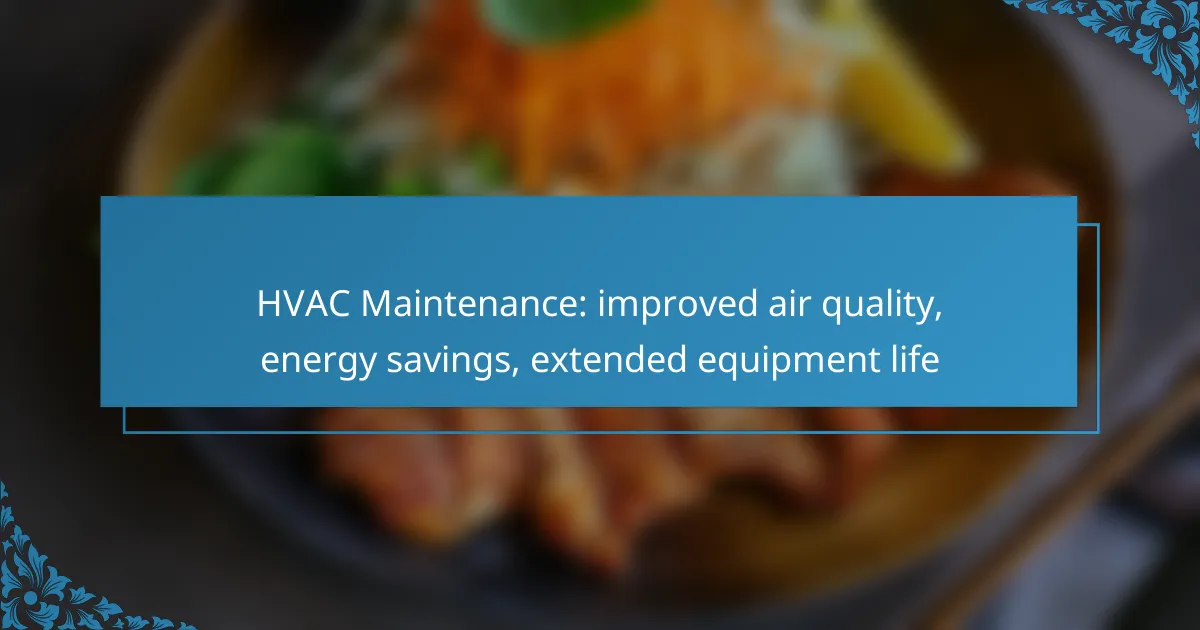Regular HVAC maintenance is essential for improving indoor air quality, enhancing energy efficiency, and prolonging the lifespan of equipment. By ensuring that systems operate at their best, homeowners can reduce pollutants and allergens while also cutting down on energy costs. Additionally, timely maintenance helps prevent breakdowns, saving money on repairs and replacements over time.
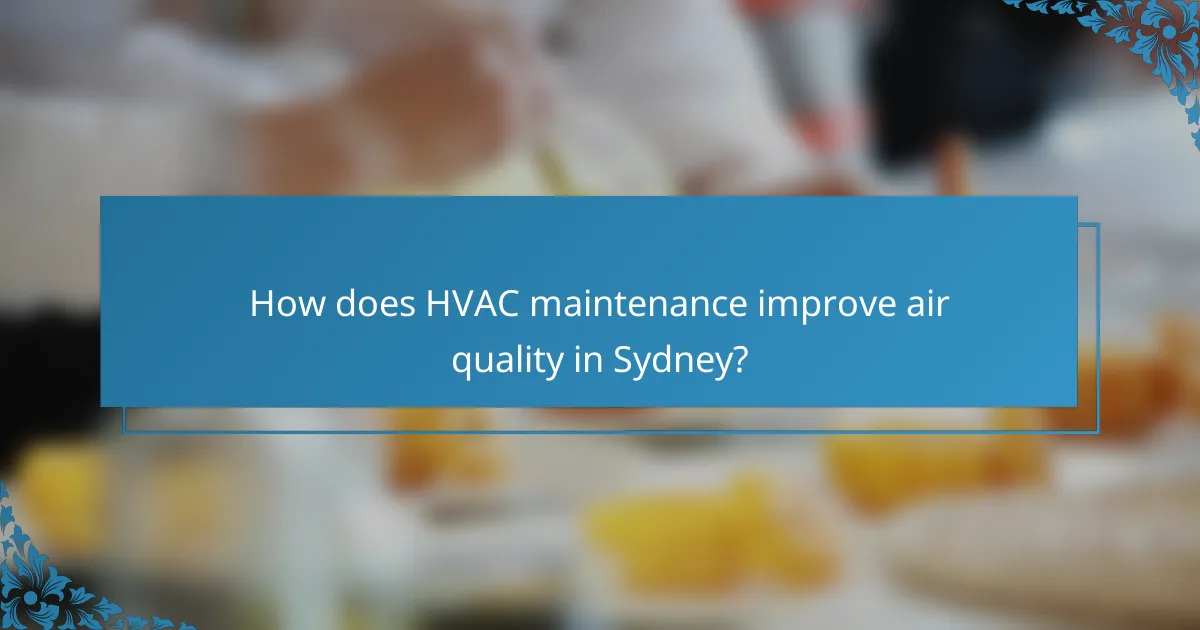
How does HVAC maintenance improve air quality in Sydney?
HVAC maintenance significantly enhances air quality in Sydney by ensuring that systems operate efficiently and effectively. Regular upkeep helps reduce pollutants, allergens, and humidity levels, leading to a healthier indoor environment.
Regular filter changes
Changing filters regularly is crucial for maintaining optimal air quality in HVAC systems. Filters trap dust, pollen, and other airborne particles, preventing them from circulating throughout your home. In Sydney’s urban environment, where air pollution can be a concern, it’s advisable to replace filters every one to three months, depending on usage and filter type.
Using high-efficiency particulate air (HEPA) filters can further improve air quality by capturing smaller particles. Always check the manufacturer’s recommendations for specific guidelines on filter changes.
Cleaning ducts and vents
Cleaning ducts and vents is essential for preventing the buildup of dust, mold, and other contaminants that can affect air quality. Over time, these areas can accumulate debris, which can be released into the air when the system operates. It’s recommended to have ducts professionally cleaned every three to five years, especially in homes with pets or allergies.
Regular inspections can help identify any issues that may require immediate attention, such as blockages or leaks. Keeping ducts clean not only improves air quality but also enhances system efficiency.
Humidity control measures
Controlling humidity levels is vital for maintaining good air quality in Sydney’s climate. High humidity can promote mold growth and dust mites, while low humidity can lead to dry skin and respiratory issues. Aim to keep indoor humidity levels between 30% and 50% for optimal comfort and health.
Using dehumidifiers or humidifiers as needed can help manage moisture levels effectively. Regularly checking and maintaining HVAC systems can ensure that humidity control measures are functioning correctly, contributing to a healthier indoor environment.
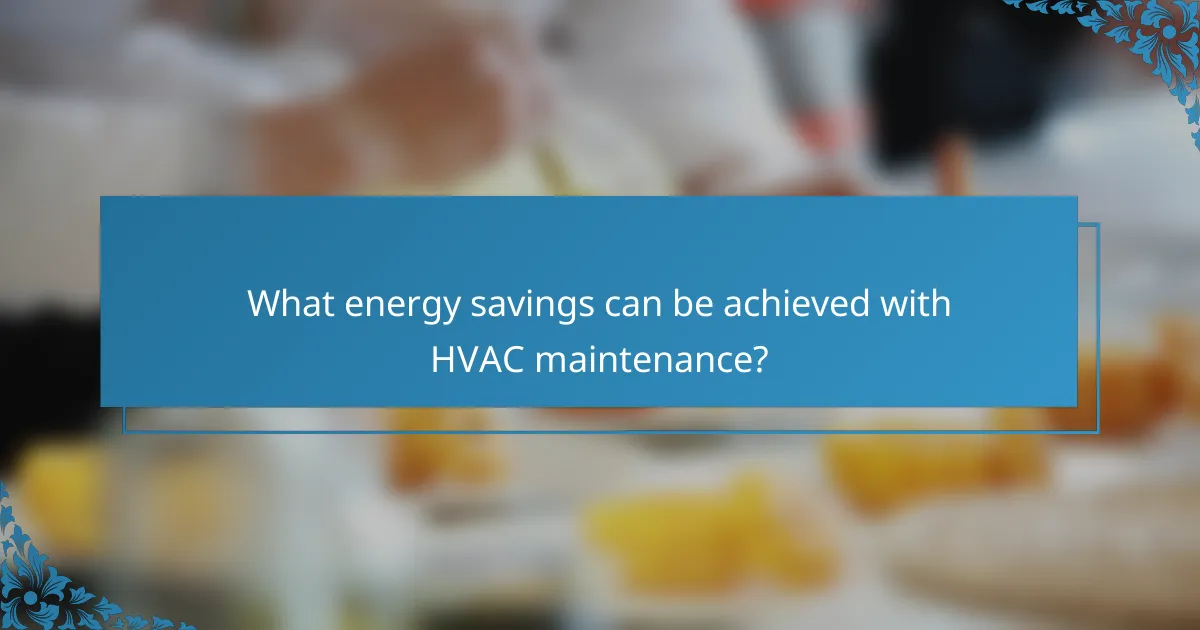
What energy savings can be achieved with HVAC maintenance?
Regular HVAC maintenance can lead to significant energy savings by ensuring that systems operate at optimal efficiency. By addressing issues like dirty filters and worn components, homeowners can reduce energy consumption and lower their monthly utility bills.
Improved system efficiency
Maintaining your HVAC system enhances its efficiency, which means it uses less energy to heat or cool your home. Regular tasks such as cleaning coils, replacing filters, and checking refrigerant levels can improve airflow and system performance. An efficient system can operate up to 20-30% better than one that is neglected.
Consider scheduling maintenance at least once a year, ideally before the peak heating or cooling seasons. This proactive approach helps identify potential issues early, preventing costly repairs and ensuring your system runs smoothly.
Reduced utility bills
With improved efficiency comes lower utility bills. Homeowners can expect to see a reduction in energy costs, often in the range of 10-20% after proper maintenance is performed. This is particularly beneficial during extreme weather months when energy consumption typically spikes.
To maximize savings, keep track of your energy bills before and after maintenance. This will help you gauge the effectiveness of the service and identify any further adjustments that may be needed.
Increased lifespan of equipment
Regular HVAC maintenance not only saves energy but also extends the lifespan of your equipment. Systems that are well cared for can last 15-20 years, while neglected units may fail within a decade. Routine checks help prevent breakdowns that can lead to expensive replacements.
Investing in maintenance can be viewed as a cost-saving measure over time. By avoiding premature replacements, homeowners can allocate funds to other home improvements or savings, making it a smart financial decision.
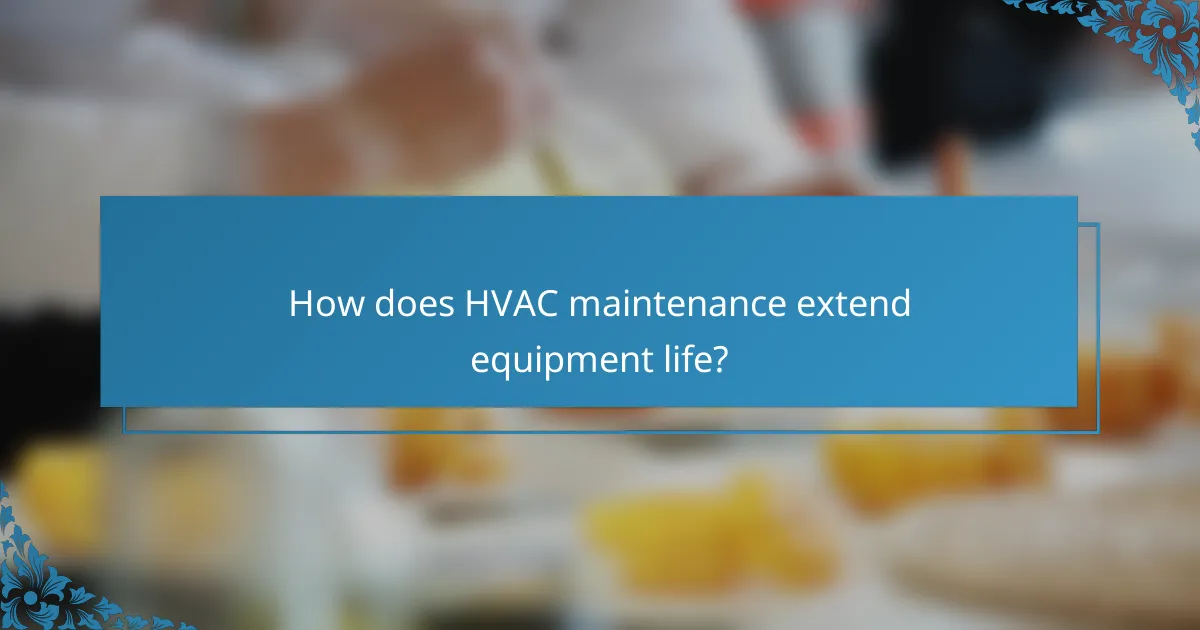
How does HVAC maintenance extend equipment life?
Regular HVAC maintenance significantly extends the lifespan of equipment by ensuring optimal performance and preventing breakdowns. By addressing potential issues early, homeowners can avoid costly repairs and replacements, ultimately saving money in the long run.
Routine inspections
Conducting routine inspections is crucial for identifying wear and tear before it leads to major failures. Technicians typically check components like filters, coils, and ductwork to ensure they are clean and functioning properly.
Homeowners should schedule inspections at least once or twice a year, ideally before the heating or cooling season begins. This proactive approach helps maintain efficiency and prolongs the life of the HVAC system.
Timely repairs
Addressing repairs promptly is essential for maintaining HVAC equipment. Delaying repairs can lead to more significant damage, which may require expensive replacements.
Common issues, such as refrigerant leaks or faulty thermostats, should be fixed as soon as they are detected. Homeowners should keep an eye out for unusual noises or inconsistent temperatures, as these can indicate underlying problems that need immediate attention.
Proper lubrication of moving parts
Proper lubrication of moving parts is vital for reducing friction and wear within the HVAC system. Components like motors and fans benefit from regular lubrication, which can help them operate smoothly and efficiently.
Homeowners should consult their HVAC system’s manual for specific lubrication recommendations and intervals. Generally, lubricating moving parts at least once a year can significantly enhance performance and extend the equipment’s lifespan.
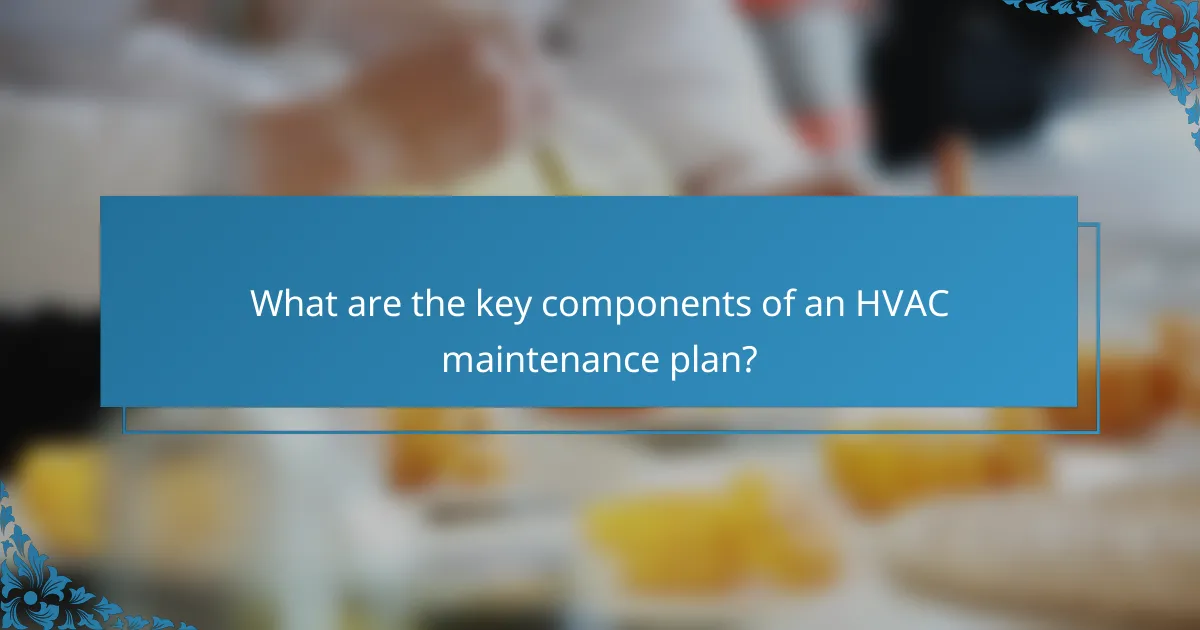
What are the key components of an HVAC maintenance plan?
An effective HVAC maintenance plan includes regular seasonal tune-ups, comprehensive cleaning, and system performance evaluations. These components work together to ensure optimal air quality, energy efficiency, and longevity of your HVAC equipment.
Seasonal tune-ups
Seasonal tune-ups are essential for preparing your HVAC system for the upcoming heating or cooling season. This typically involves checking and adjusting system components, such as thermostats, filters, and ductwork, to ensure they are functioning correctly.
During a tune-up, technicians may replace air filters, lubricate moving parts, and inspect electrical connections. Scheduling these tune-ups twice a year can help prevent costly breakdowns and improve energy efficiency by up to 15%.
Comprehensive cleaning
Comprehensive cleaning of your HVAC system is crucial for maintaining good air quality and system performance. This process includes cleaning coils, drain pans, and ductwork to remove dust, debris, and allergens that can accumulate over time.
Regular cleaning not only enhances indoor air quality but also helps your system run more efficiently. A clean system can operate at peak performance, potentially reducing energy costs by 10-20% and extending the life of your equipment.
System performance evaluations
System performance evaluations involve assessing the overall efficiency and functionality of your HVAC system. This includes measuring airflow, checking refrigerant levels, and evaluating the system’s ability to maintain desired temperatures.
These evaluations can identify potential issues before they escalate, allowing for timely repairs. Regular assessments can lead to significant energy savings and ensure compliance with local regulations, enhancing both comfort and safety in your home or business.
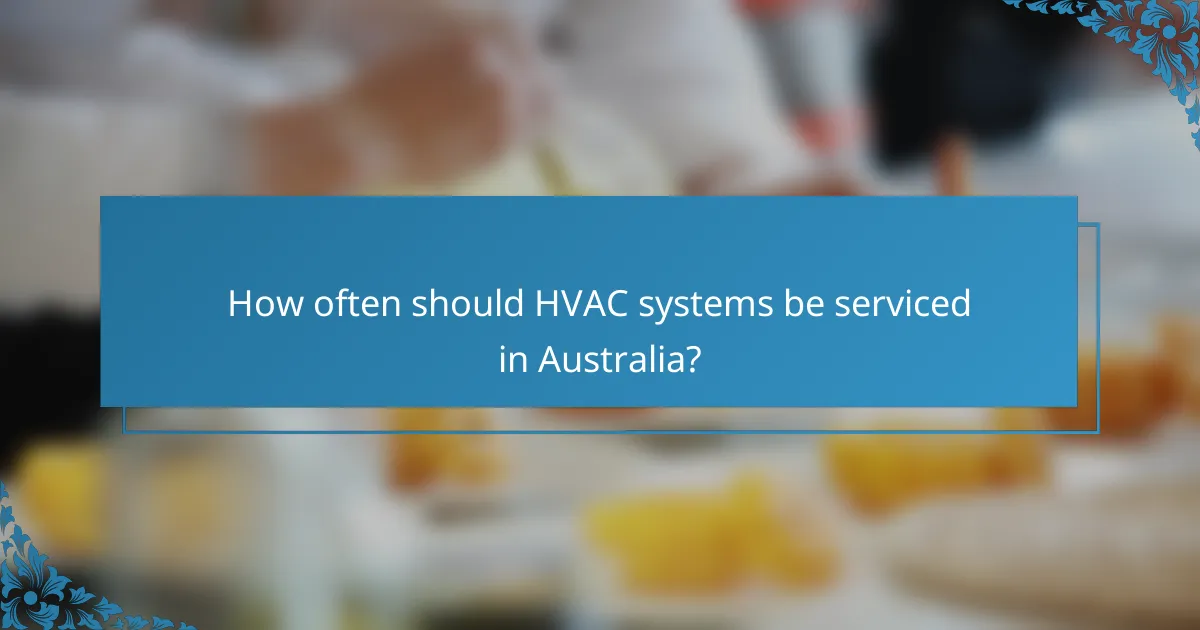
How often should HVAC systems be serviced in Australia?
In Australia, HVAC systems should typically be serviced at least once or twice a year to ensure optimal performance and air quality. Regular maintenance helps prevent breakdowns, improves energy efficiency, and extends the lifespan of the equipment.
Biannual maintenance recommendations
For most residential HVAC systems in Australia, biannual maintenance is recommended. This usually involves servicing before the cooling season in spring and before the heating season in autumn. Regular checks can help identify potential issues early, ensuring the system operates efficiently throughout the year.
During these maintenance visits, technicians will inspect and clean components such as filters, coils, and ducts. They may also check refrigerant levels and test system controls to ensure everything is functioning correctly.
Seasonal service guidelines
Seasonal service guidelines suggest that HVAC systems be prepared for the upcoming weather changes. In spring, focus on air conditioning units by cleaning outdoor coils and ensuring that the system is ready for increased demand. In autumn, prioritize heating systems by checking furnaces and heat pumps for efficiency and safety.
These seasonal checks can include replacing filters, inspecting ductwork for leaks, and ensuring that thermostats are calibrated. This proactive approach can lead to better energy savings and improved indoor air quality.
Factors affecting service frequency
Several factors can influence how often HVAC systems should be serviced. The age of the system, local climate conditions, and usage patterns all play a role. For instance, systems in areas with extreme temperatures or high humidity may require more frequent servicing.
Additionally, households with pets or smokers may need to change filters more often and schedule more regular maintenance to maintain air quality. It’s essential to assess these factors to determine the best service frequency for your specific HVAC system.
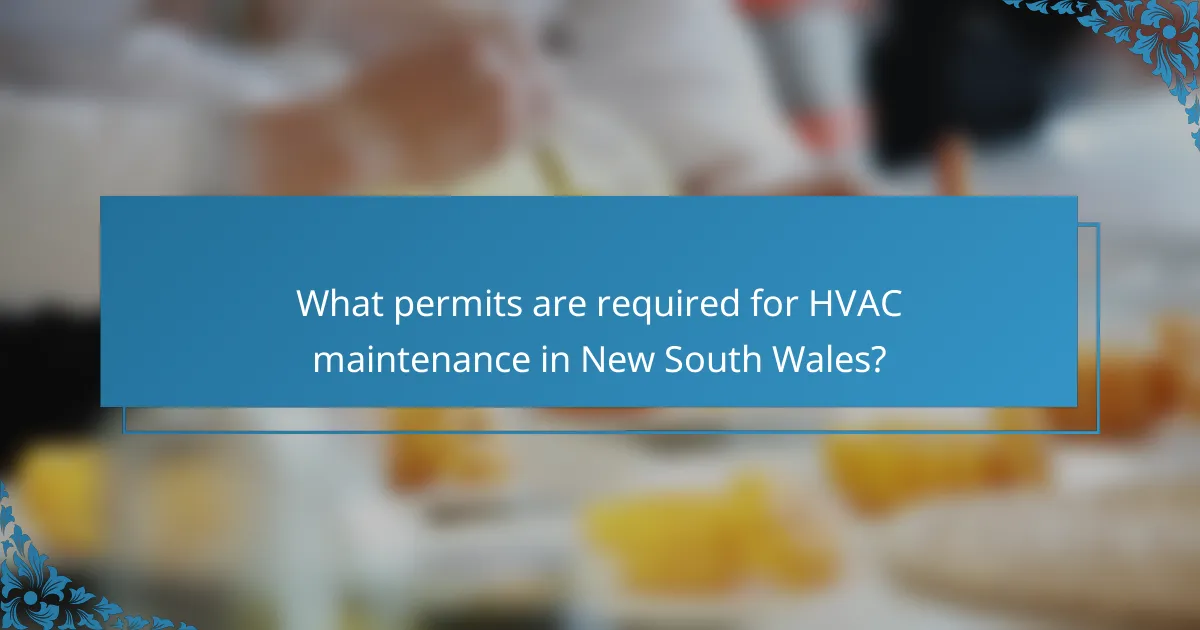
What permits are required for HVAC maintenance in New South Wales?
In New South Wales, HVAC maintenance typically requires compliance with local regulations, but specific permits may not be necessary for routine maintenance tasks. However, any significant modifications or installations often necessitate obtaining permits from local councils or relevant authorities.
Licensing requirements
In New South Wales, technicians performing HVAC maintenance must hold a valid license issued by the NSW Fair Trading. This ensures that they meet the necessary training and competency standards required for safe and effective service.
Common licensing categories include the Air Conditioning and Refrigeration License, which is essential for work involving refrigerants. Technicians should also be familiar with the Australian standards related to HVAC systems to ensure compliance during maintenance.
It is advisable for property owners to verify the credentials of any HVAC service provider before hiring. This can help avoid potential issues related to unlicensed work and ensure that maintenance is performed to the highest standards.
